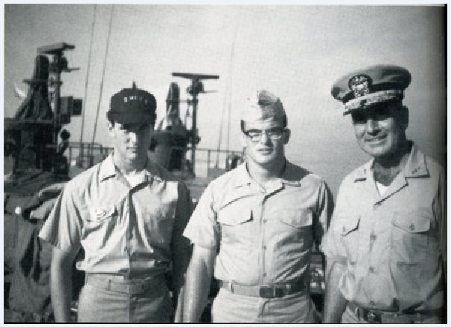Like many Vietnam veterans, Lt. Col. James "Jim" Zumwalt (ret.), my fellow Marine, says he has spent the past 40 years trying to expiate what he calls the raw wounds of that war and its aftermath.

Left to right: Elmo Zumwalt III, James "Jim" Zumwalt, and Elmo Zumwalt Jr. at a patrol boat base in Vietnam 1969. Credit: Zumwalt family photo.
Like many Vietnam veterans, Lt. Col. James "Jim" Zumwalt (ret.), my fellow Marine, says he has spent the past 40 years trying to expiate what he calls the raw wounds of that war and its aftermath.
For Jim, the years following the war turned out worse than the combat. His father, Elmo Zumwalt Jr., served as commander of U.S. naval forces in Vietnam from 1968 to 1970 at the same time his brother, Elmo Zumwalt III, commanded riverine patrol craft PCF-35 operating near Da Nang and later the southern tip of Vietnam.
Crewman on those patrol boats experienced a high casualty rate because they operated on narrow waterways where the banks were lush with vegetation, giving the Viet Cong ample cover to ambush crews.
Zumwalt Jr., who became the youngest chief of Naval operations in 1970, decided to eliminate this natural cover by ordering the spraying of the chemical defoliant Agent Orange on the river banks patrolled by the boats of the "brown water Navy," including the one commanded by his namesake son.
That tactical decision unleashed a chemical time bomb on the Zumwalt family. Agent Orange contained carcinogens, and in 1983, Zumwalt III was diagnosed with lymphatic cancer, a result of his exposure to Agent Orange, he later wrote.
Zumwalt III died in 1988 , but not before he co-authored with his father the book My Father, My Son , a tale of generational military service that dates back to the American Revolution and courage in the face of adversity.
Today, Jim Zumwalt has weighed in with his own book, Bare Feet, Iron Will: Stories from the Other Side of Vietnam's Battlefields , a courageous story of our enemies in Vietnam. The book will have its formal launch at noon on April 26 at the Navy Memorial in Washington. (The Navy Memorial has a bas-relief that features PCF-35, the patrol boat commanded in Vietnam by Zumwalt III.)
I write courageous because it treats the enemy we faced in Vietnam with understanding and sympathy, a take Jim told me that he feared would arouse the wrath of some Vietnam veterans who have yet to come to terms with the war.
But, as Jim told me and as he relates in his book, by meeting his enemy, he started the process of healing his anger and grief, especially over the loss of his brother.
In 1994, Jim accompanied his father on a trip to Hanoi to provide Vietnamese veterans of the war with artificial limbs and wheelchairs. On that trip, Jim watched his 73-year-old father lift and then place a legless Vietnamese veteran in a wheelchair. At that moment, Jim realized that his father had "an immense compassion . . . for those who were less fortunate, whether friend or foe."
This compassion and humanitarianism, Jim says in his book, provided his father with "a basis for putting the tragedies of this war behind him."
During that 1994 trip, however, Jim still felt more anger than compassion towards the Vietnamese he first encountered -- until he met Maj. Gen. Nguyen Huy Phan. When the two met, Phan immediately expressed sympathy for the loss of Jim's brother, Elmo. Later in their conversation, Phan, Jim wrote, became reflective and his "eyes betrayed an internal anguish." As Phan's eyes misted, Jim wrote, "I sensed a personal tragedy loomed in his life as well. I felt an instant bond forming with him."
That bond deepened, Jim said, when he found out that Phan, too, had lost a brother in the war, and his anger started to dissipate as he came to "recognize the significance of a loved one's loss was not measured simply by which side of the battlefield on which he had stood."
Inspired by this encounter -- and with a nod to the compassion of his father -- Jim decided to tell in Bare Feet, Iron Will the tale of soldiers on the other side of the Vietnam War, interviewing some 200 former enemies.
In writing his book, Jim says in the introduction, he came upon the principal of universality, which to him means the recognition of "the commonality of suffering, so that, once the fighting ends, a common ground can be plowed in which the seeds of friendship are sown."
This is a powerful tale told by a real warrior -- Jim served in the Marines from the Vietnam War through the first Iraq War -- not a sunshine patriot. That fact can help heal the still raw wounds of the Vietnam War.
Jim Zumwalt will discuss and sign copies of his book at the Navy Memorial, 701 Pennsylvania Ave., NE, in Washington at noon on April 26. The event is free and open to the public.






